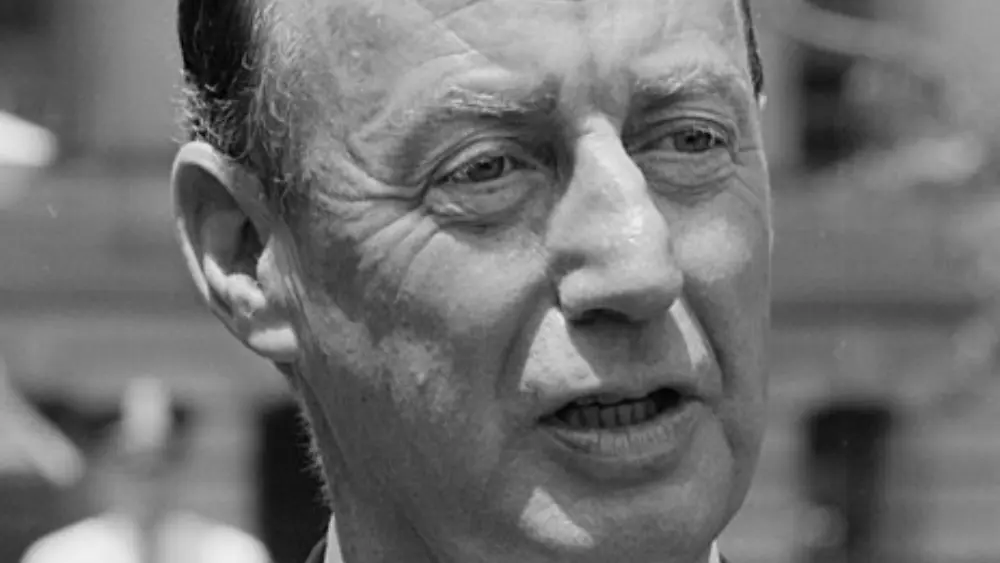Adlai Stevenson II, born on February 5, 1900, was a distinguished American statesman known for his leadership within the Democratic Party and his unwavering commitment to policy advocacy. As the 31st Governor of Illinois and a two-time Democratic presidential nominee, Stevenson made a lasting impact on American political history.
Early Life and Education: Nurturing the Seeds of Public Service
Adlai E. Stevenson’s journey into public service was rooted in his upbringing and education. Coming from a politically active family, Stevenson was exposed to the ideals of public service from an early age. His experiences in this environment laid the groundwork for a future dedicated to contributing meaningfully to American governance. Stevenson’s academic pursuits at Princeton University further shaped his intellectual acumen and concurrently fueled his passion for public policy. Subsequently, this formative period not only refined his thinking but also laid the groundwork for his future contributions to the realms of governance and public service. The seeds of his commitment to serving the public were nurtured during these formative years, providing a solid foundation for the impactful career that lay ahead.
Stevenson’s time at Princeton not only significantly enhanced his intellectual capabilities but also instilled in him a profound sense of duty to society. Consequently, this transformative period not only sharpened his academic prowess but also cultivated a strong commitment to addressing societal needs and contributing meaningfully to public service. The university experience became a crucible for the development of his worldview, which emphasized the importance of public service in shaping a just and equitable society. These early influences played a pivotal role in steering Stevenson towards a path dedicated to making a positive impact on the nation through his contributions to public policy and governance.
Adlai Stevenson II: Academic Prowess and Political Legacy
Adlai Stevenson II’s early life was marked by a combination of academic prowess and a deep commitment to his family’s political legacy. Demonstrating intellectual excellence, Stevenson exhibited an early interest in the realms of law and politics. This early fascination with these fields not only set the stage but also paved the way for a remarkable career that would later become synonymous with democratic principles and governance. As a result, these early interests became the foundation upon which a distinguished legacy was built, characterized by a steadfast commitment to the ideals of democracy and effective governance.
His academic pursuits not only reflected his intellectual capabilities but also revealed a genuine passion for understanding the intricacies of the legal and political systems. Stevenson’s commitment to the principles of democracy became unmistakably evident during these formative years. Consequently, this early dedication provided a clear trajectory for his future endeavors, shaping the course of his career and solidifying his role as a prominent advocate for democratic ideals in both domestic and international spheres. His academic achievements and early engagement with political ideas would serve as the foundation for a legacy that extended far beyond his educational years, defining him as a prominent figure in American politics and diplomacy.
Governor of Illinois: Pioneering Progressive Policies
Adlai Stevenson II’s tenure as the Governor of Illinois from 1949 to 1953 was marked by the implementation of pioneering progressive policies. Stevenson’s leadership focused on a broad spectrum of issues, ranging from social reforms to educational initiatives and efforts to enhance good governance. His commitment to these principles earned him a reputation as a forward-thinking and compassionate leader dedicated to improving the well-being of the people he served.
Stevenson’s progressive policies were characterized by a genuine concern for the welfare of his constituents. He aimed to address societal challenges and inequalities through legislative measures that prioritized education, social justice, and effective governance. Stevenson’s approach as governor foreshadowed, in many ways, his later role as a national figure advocating for progressive values. Consequently, his tenure as governor left a lasting impact on both the state of Illinois and the broader landscape of American politics. Moreover, the principles he championed during his gubernatorial term served as a precursor to his influential contributions to the national discourse on progressive governance.
Adlai Stevenson II: Progressive Reforms and Effective Governance
Adlai Stevenson II’s time as Governor of Illinois showcased his dedication to enacting progressive reforms and fostering effective governance. Stevenson deeply committed himself to addressing social and economic challenges, and his policies reflected a pragmatic approach to improving the lives of Illinois residents. He championed initiatives that prioritized education, social justice, and good governance, earning him a reputation as a leader who could bring about positive change.
Stevenson’s focus on progressive reforms extended beyond ideological principles; he demonstrated a practical understanding of governance that resonated with the people of Illinois. His ability to navigate the complexities of state politics and implement policies that aligned with his vision for a more just and equitable society set him apart as a leader who could balance ideals with pragmatic action. This pivotal period in Stevenson’s career not only marked a significant chapter but also laid the groundwork for his later contributions to national politics. Consequently, his unwavering commitment to progressive values and effective governance during this time continued to shape his legacy. Furthermore, the principles he honed and championed became enduring pillars that defined his influential role on the national stage.
Presidential Campaigns: The Democratic Standard-Bearer
Adlai Stevenson II emerged as the Democratic standard-bearer in the 1952 and 1956 presidential elections, cementing his position as a key figure within the party. His eloquence, intellectual prowess and commitment to principled governance defined his campaigns. Despite facing a formidable opponent in Dwight D. Eisenhower and experiencing defeat in both elections, Stevenson’s presidential bids nonetheless left a lasting impact on American politics. Furthermore, his campaigns, marked by resilience and adherence to democratic principles, contributed significantly to shaping the political discourse and influencing subsequent generations of political leaders.
Stevenson’s appeal lay in his ability to articulate a vision for the nation that centered on progressive values, diplomacy, and a nuanced understanding of complex issues. His speeches and debates with Eisenhower showcased his wit and intellectual depth, earning him admiration even in the face of electoral losses. Stevenson’s campaigns not only solidified his role as a leading Democrat but also contributed to the shaping of the party’s identity during a critical period in American history.
Adlai Stevenson II: Eloquence and Commitment to Principles
Adlai Stevenson II, renowned for his eloquence and steadfast commitment to his principles, made a lasting impact on American politics through his presidential campaigns in 1952 and 1956. Stevenson’s speeches and debates demonstrated his exceptional oratorical skills, making him a compelling figure within the Democratic Party. His ability to communicate a vision for the nation centered on progressive values and a principled approach to governance set him apart as a leader of intellectual depth.
While Stevenson faced electoral defeats against Dwight D. Eisenhower in both campaigns, his unwavering commitment to principles garnered him widespread admiration. He remained steadfast in his dedication to diplomacy, progressive reforms, and thoughtful governance. Stevenson’s legacy extends beyond the electoral arena, influencing the Democratic Party’s identity during a crucial period in American history and leaving a lasting impression on the discourse of principled leadership.
United Nations Ambassador: Diplomacy on the Global Stage
As the U.S. Ambassador to the United Nations, Adlai Stevenson became a pivotal figure in American diplomacy on the global stage. Appointed by President John F. Kennedy, Stevenson’s tenure coincided with one of the most critical moments in Cold War history—the Cuban Missile Crisis of 1962. During this intense standoff between the United States and the Soviet Union, Stevenson showcased his diplomatic prowess in addressing the United Nations Security Council. His articulate and measured response, including the presentation of photographic evidence of Soviet missile sites in Cuba, played a crucial role in de-escalating tensions and averting a potential nuclear conflict. Stevenson’s calm and reasoned approach earned him admiration for his statesmanship and commitment to international peace.
Stevenson’s role as U.S. Ambassador to the United Nations extended beyond the Cuban Missile Crisis, as he continued to engage in diplomatic efforts to address global challenges. His commitment to multilateralism and collaboration on the world stage underscored his belief in the power of diplomacy to navigate complex geopolitical issues. Stevenson’s legacy in this role remains deeply intertwined with his pivotal contributions to averting a nuclear crisis and promoting the principles of international cooperation. Consequently, his exemplary leadership established him as a diplomatic statesman during a crucial period of Cold War history. Furthermore, his enduring impact in navigating the complexities of global politics underscored the importance of diplomatic finesse and strategic vision in preserving global peace and stability.
Adlai Stevenson II: Crisis Diplomacy and Global Engagement
Adlai Stevenson’s tenure as the U.S. Ambassador to the United Nations solidified his reputation as a skilled statesman adept at crisis diplomacy. Serving during the Cuban Missile Crisis in 1962, Stevenson faced the daunting task of presenting evidence to the United Nations Security Council, revealing the presence of Soviet missiles in Cuba. His articulate and forceful representation not only effectively conveyed the gravity of the situation but also played a crucial role in garnering international support for the United States’ response. Stevenson’s ability to navigate the complexities of global geopolitics during this critical moment demonstrated his commitment to diplomatic solutions and his skill in crisis management.
Beyond the specific challenges of the Cuban Missile Crisis, Stevenson’s broader engagement at the United Nations underscored his dedication to global affairs. His diplomatic efforts aimed at promoting international cooperation, addressing conflicts, and upholding principles of peace and security. Stevenson’s legacy in crisis diplomacy and global engagement reflects his enduring commitment to diplomacy as a means of resolving conflicts and fostering a more secure and cooperative world.
Legacy and Impact: Shaping Democratic Values
Adlai Stevenson II deeply rooted his legacy in his significant contributions to shaping democratic values within the United States. As a two-time Democratic presidential nominee in the 1950s, Stevenson became a standard-bearer for the party, emphasizing principles, eloquence, and a commitment to progressive policies. His influence on the Democratic Party has endured over the years, with his approach to governance serving as a touchstone for those who seek to align the party with values of social justice, effective governance, and a principled approach to leadership.
Stevenson’s impact extends beyond domestic politics to the realm of international diplomacy. His tenure as the U.S. Ambassador to the United Nations, particularly during the Cuban Missile Crisis, showcased his dedication to crisis diplomacy and the pursuit of global peace. Stevenson’s legacy serves as a reminder of the importance of principled leadership, intellectual rigor, and a commitment to democratic ideals in shaping both national and international discourse. His contributions continue to inspire those who strive to uphold democratic values and work towards a more just and equitable world.

Adlai Stevenson II: Shaping Democratic Values and Inspiring Leadership
Adlai Stevenson II has intricately woven his enduring legacy into the fabric of the Democratic Party’s values and provided inspiration to subsequent generations of leaders. As a two-time Democratic presidential nominee in the 1950s, Stevenson became a symbol of principled leadership, emphasizing the importance of integrity, intellect, and dedication to progressive policies. His eloquent articulation of democratic ideals has made a lasting impact on the party’s ethos, shaping the direction of Democratic leadership.
Beyond electoral politics, Stevenson’s impact extends significantly to the realm of international diplomacy. Notably, he played a pivotal role as the U.S. Ambassador to the United Nations during the Cuban Missile Crisis. In this capacity, he demonstrated exceptional diplomatic skill and leadership, navigating the complexities of the crisis with finesse and contributing to the resolution of one of the most critical events in Cold War history. His adept handling of this critical moment showcased his commitment to crisis diplomacy and the pursuit of global peace. Stevenson’s legacy serves as a guiding light for those who aspire to uphold democratic values and engage in principled leadership, reminding us that intellectual rigor, moral clarity, and a steadfast commitment to public service are enduring virtues that transcend political epochs.











